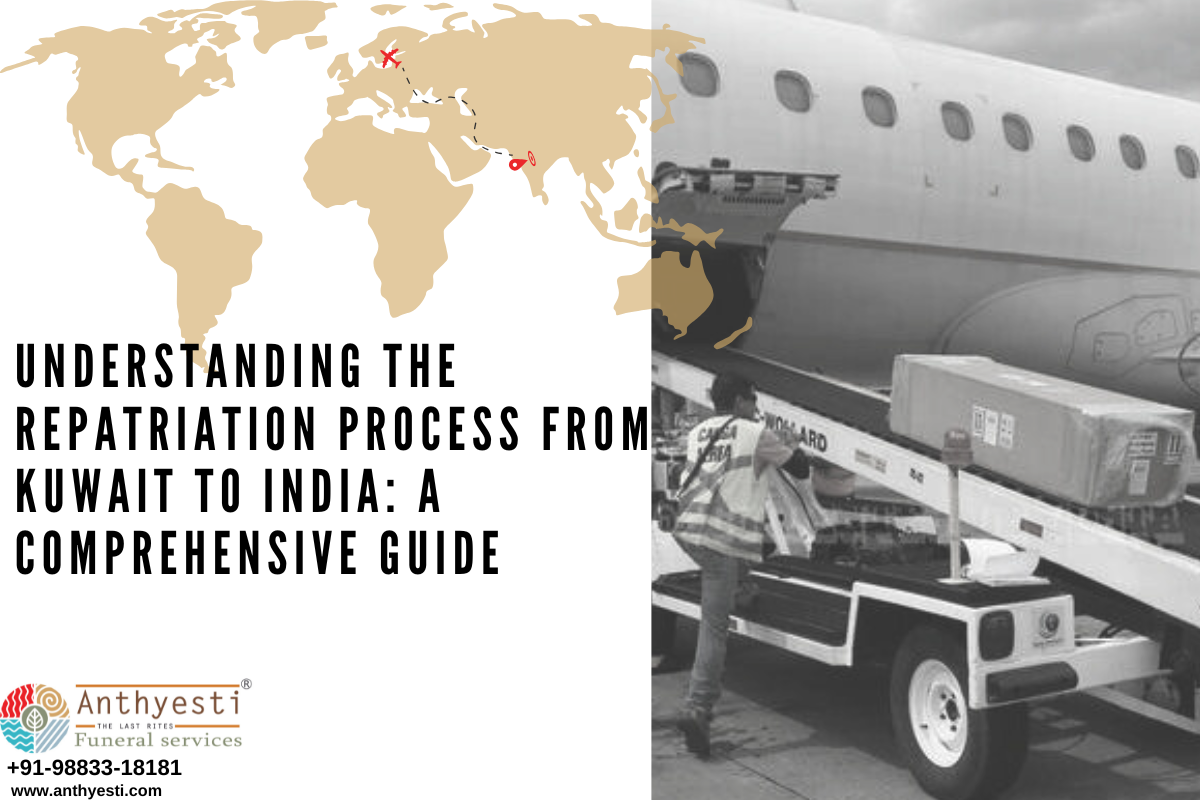Understanding the Repatriation Process from Kuwait to India: A Comprehensive Guide
The loss of a loved one is an incredibly difficult time, and managing the repatriation of their mortal remains can add layers of complexity. Repatriation refers to the process of transferring the deceased’s body back to their home country for final rites. For families navigating the repatriation process from Kuwait to India, having clear information and guidance is essential.
At Anthyesti Funeral Services, we specialize in offering comprehensive repatriation services to ease this journey for families. This guide will walk you through the steps, required documentation, and our role in ensuring a seamless experience.
What Is Repatriation?
Repatriation involves transporting a deceased person’s remains from the place of death to their home country. This process is vital for families who want to perform last rites in accordance with their cultural and religious traditions. It involves legal formalities and coordination between authorities, airlines, and service providers.
Steps in the Repatriation Process:
Step 1: Initial Notification and Documentation
After the passing of a loved one, families must notify the hospital or relevant medical authorities. The hospital issues a death certificate, which serves as the primary document for repatriation. This certificate is the first step in obtaining further clearances.
Step 2: Obtaining Clearance from Local Authorities
Local authorities in Kuwait, including the Ministry of Health, must validate the death certificate. If the death occurred under unusual circumstances, a police clearance may also be required. These clearances are essential for proceeding with embassy approvals.
Step 3: Embassy Clearance
Families must contact the Indian Embassy in Kuwait for a No Objection Certificate (NOC). The embassy requires the death certificate, the deceased’s passport, and a formal repatriation request. Once issued, the NOC allows airlines to transport the remains.
Step 4: Preparation of the Mortal Remains
The body is embalmed to preserve it during transportation, as required by international standards. The embalmed body is placed in a sealed coffin to ensure safety and compliance. This step ensures the remains reach their destination in the best condition.
Step 5: Airline Coordination and Transportation
Airlines have specific guidelines for transporting mortal remains. The family or service provider must present all required documents, including the NOC and embalming certificate, to book a flight. The remains are then transported as cargo to India.
Step 6: Receiving the Mortal Remains in India
Upon arrival, the remains are handed over to the family or authorized representative. Indian authorities may require additional verification of documents at customs. Families can then proceed with the final rites.
Step 7: Final Rites
Once the body is received, families perform the final rites according to their cultural and religious practices. This step brings closure and honors the memory of the deceased.
Required Documents for Repatriation
The following documents are necessary to complete the repatriation process:
- Death Certificate: Issued by the hospital and authenticated by the Ministry of Health in Kuwait.
- Embalming Certificate: Confirms that the body has been preserved for transportation.
- Police Clearance Certificate: Required if the death was due to unnatural causes.
- No Objection Certificate (NOC): Issued by the Indian Embassy in Kuwait.
- Passport of the Deceased: Needed for embassy and airline documentation.
Role of Funeral Service Providers:
Funeral service providers play a crucial role in simplifying the repatriation process. They handle the documentation, coordinate with authorities, and manage the logistics. With professional assistance, families can focus on grieving while experts ensure a smooth process.
Challenges in the Repatriation Process:
The repatriation process can be daunting due to its intricate legal and logistical requirements. Delays in obtaining critical documents, such as death and police clearance certificates, are common. Each country follows its own procedures, which can create confusion for families unfamiliar with the process. Additionally, coordinating with airlines for cargo space and adhering to their specific guidelines can be overwhelming. With a professional service provider like Anthyesti, families can overcome these hurdles efficiently.
Costs Involved in Repatriation:
Repatriation involves various expenses, including embalming, coffin preparation, and airline cargo fees. Additional costs may arise for documentation, such as embassy clearances and police verification. The overall cost depends on factors like the type of coffin, distance, and airline charges. Anthyesti offers cost-effective solutions by tailoring services to fit each family’s budget and needs. Transparent pricing ensures families are well-informed of all expenses upfront, avoiding unexpected costs.
Tips for Families:
Families can benefit greatly by familiarizing themselves with the repatriation process early on. Understanding the required documents and timelines can help avoid unnecessary delays. Engaging a professional service provider like Anthyesti simplifies the process and ensures all legal requirements are met. Maintaining regular communication with the Indian Embassy and funeral service provider helps families stay updated on the progress. Lastly, keeping a checklist of tasks and documents ensures a smoother repatriation experience.
FAQ’s:
Q1: How long does the repatriation process take?
The repatriation process usually takes 5-7 days, depending on clearances and flight availability. Delays may occur due to procedural or documentation issues.
Q2: What happens if required documents are missing?
Missing documents can cause significant delays. It’s advisable to seek help from the Indian Embassy and service providers for guidance on obtaining the necessary paperwork.
Q3: Is embalming mandatory for repatriation?
Yes, embalming is a global requirement for transporting mortal remains. It preserves the body during transit and ensures compliance with international health regulations.
Q4: Can Anthyesti provide repatriation services during public holidays?
Yes, Anthyesti operates 24/7, including on public holidays, to ensure seamless repatriation services. Families can rely on us for support at any time.
Q5: How much does repatriation from Kuwait to India cost?
The cost varies based on several factors such as embalming, documentation, and airline charges. Anthyesti offers transparent pricing and customized solutions to meet different family requirements.
Call us at +91 87925 63332

